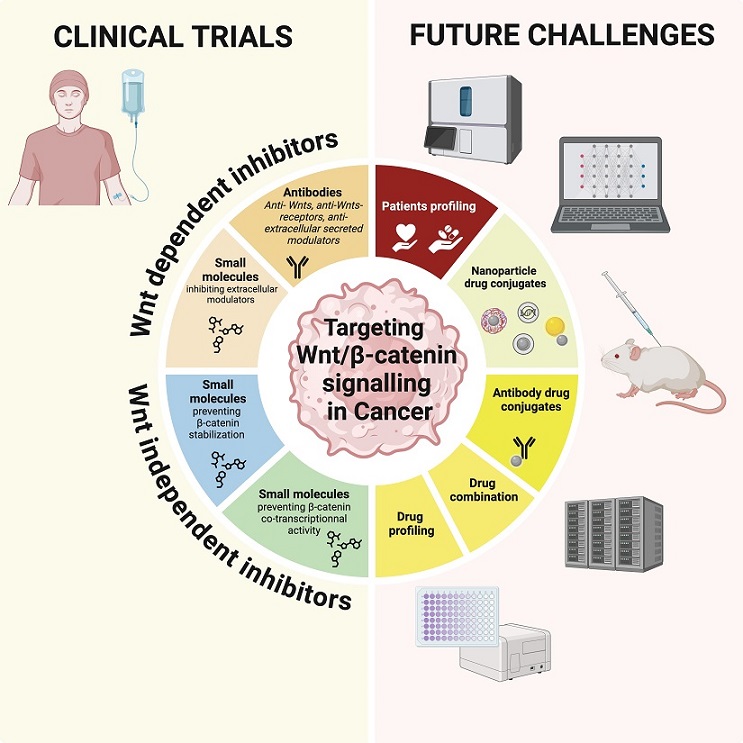Nikhil Prasad Fact checked by:Thailand Medical News Team Jul 18, 2024 1 year, 2 months, 3 weeks, 6 days, 8 hours, 19 minutes ago
Cancer Updates: Despite advances in cancer treatment, a promising pathway known as Wnt/β-catenin remains largely untapped in routine cancer care. This
Cancer Updates news report delves into the reasons behind this phenomenon and explores the potential future of Wnt/β-catenin-targeted therapies.
 Graphical Abstract - Wnt/Beta-Catenin pathway should be targeted in routine cancer care
Graphical Abstract - Wnt/Beta-Catenin pathway should be targeted in routine cancer care
Researchers from the Montpellier Cancer Research Institute, University of Montpellier, Inserm, and ICM in France, including Auriane de Pellegars-Malhortie, Laurence Picque Lasorsa, Thibault Mazard, Fabien Granier, and Corinne Prévostel, have been at the forefront of this research.
The Significance of Wnt/β-Catenin
Discovered in 1984, the Wnt/β-catenin signaling pathway plays a crucial role in various biological processes, from embryogenesis to the maintenance and regeneration of adult tissues. The pathway involves the interaction of Wnt proteins with Frizzled (FZD) receptors, activating a series of intracellular events leading to the stabilization and activity of β-catenin, a protein that controls the expression of genes critical for cell growth and survival.
Why Target Wnt/β-Catenin?
Given its pivotal role in cell proliferation and survival, the Wnt/β-catenin pathway is a prime target for cancer therapy. Mutations and dysregulation of this pathway are common in various cancers, including colorectal, liver, and breast cancers. By targeting components of the Wnt/β-catenin pathway, medical researchers an oncologist can aim to halt cancer progression and improve patient outcomes.
The Challenges of Targeting Wnt/β-Catenin
Despite its potential, targeting the Wnt/β-catenin pathway presents several challenges. One of the primary issues is the therapeutic index, which refers to the balance between the effective anticancer activity of a drug and its toxicity. The Wnt/β-catenin pathway is vital for the normal functioning of many tissues, making it difficult to target cancer cells without harming healthy ones.
-Therapeutic Index and Toxicity: The pathway's importance in tissue homeostasis and regeneration means that inhibiting it can lead to significant side effects. For instance, bone toxicity has been a major concern in clinical trials involving Wnt/β-catenin inhibitors, limiting their use in routine care.
-Complexity of the Pathway: The Wnt/β-catenin signaling pathway is highly complex, involving multiple ligands, receptors, and intracellular components. This complexity makes it challenging to develop drugs that can selectively target cancer cells without affecting normal cells.
Current Strategies and Clinical Trials
Researchers have explored various strategies to inhibit the Wnt/β-catenin pathway,
including small molecule inhibitors, antibodies, and gene-based approaches. Some of these strategies have shown promise in clinical trials, but none have yet become standard treatments.
-Antibody-Based Therapies: Antibodies such as ipafricept and vantictumab target components of the Wnt/β-catenin pathway. These antibodies have shown encouraging results in early-phase clinical trials, particularly in combination with other anticancer agents. However, bone toxicity remains a significant hurdle.
-Small Molecule Inhibitors: Small molecule inhibitors like LGK974, ETC-159, and CGX1321 aim to block the pathway at different stages. These inhibitors have shown potential in preclinical and early clinical trials, particularly when combined with immune checkpoint inhibitors like pembrolizumab.
-Gene-Based Approaches: Gene-based therapies involve using technologies such as RNA interference to downregulate the expression of Wnt/β-catenin pathway components. These approaches are still in the experimental stages but hold promise for future cancer treatments.
Promising Combinations and Future Directions
Combining Wnt/β-catenin inhibitors with other treatments has shown potential in overcoming some of the challenges associated with targeting this pathway.
-Combination with Immune Checkpoint Inhibitors: Combining Wnt/β-catenin inhibitors with immune checkpoint inhibitors, such as nivolumab and pembrolizumab, has shown increased immune cell infiltration in tumors and improved response rates in early trials. This combination could potentially enhance the efficacy of immunotherapy in cancers that are otherwise resistant to treatment.
-Targeted Drug Delivery: Innovative drug delivery systems, such as nanovectorization and antibody-drug conjugates (ADCs), are being developed to enhance the specificity and reduce the toxicity of Wnt/β-catenin inhibitors. These systems aim to deliver drugs directly to cancer cells, minimizing the impact on healthy tissues.
-Patient Profiling: Personalized medicine approaches, including genomic profiling and the identification of biomarkers, are crucial for optimizing Wnt/β-catenin-targeted therapies. By tailoring treatments to the genetic profile of individual patients' tumors, researchers hope to improve outcomes and reduce adverse effects.
Conclusion
While the Wnt/β-catenin pathway holds significant promise as a target for cancer therapy, several challenges must be overcome before these treatments can become part of routine clinical practice. Ongoing research and clinical trials continue to explore innovative strategies to harness the potential of this pathway while minimizing toxicity.
The study findings were published in the peer-reviewed journal: Pharmaceuticals.
https://www.mdpi.com/1424-8247/17/7/949
Thailand Medical News is currently working with a number of researchers in developing phytochemical based protocols that can target the Wnt/β-catenin without any toxic or serious adverse effects. We are planning to start observational clinical trials in Vietnam, Brazil and Romania in October this year with a focus on 4 different types of cancers initially.
For the latest
Cancer Updates, keep on logging to
Thailand Medical News.
Read Also:
https://www.thailandmedical.news/news/wnt-beta-catenin-signaling-inhibitors-can-be-used-as-antivirals-against-sars-cov-2-and-possibly-other-viruses
https://www.thailandmedical.news/news/breaking-sars-cov-2-causes-brain-microvascular-endothelial-cells-to-become-dysfunctional-via-modulating-the-wnt-signaling-pathway
